Reshaping the Future of Dentistry: Applications of the 4th Industrial Revolution on Oral and Maxillofacial Surgery
Alumni attended an insightful talk by Director, Discipline of Oral and Maxillofacial Surgery, Associate Professor Raymond Wong, where he shared how technologies are transforming the dentistry and healthcare professions.
The 4th Industrial Revolution has brought about a host of technological advancements that have reshaped various professions, including healthcare and dentistry. One of the fields which has seen significant transformation is oral and maxillofacial surgery – a specialty that deals with the diagnosis and treatment of diseases, injuries, and defects of the head, neck, face, jaws, and the hard and soft tissues of the oral and maxillofacial region.
On 2 March 2023 (Thursday), close to 40 NUS Faculty of Dentistry alumni attended a talk by Director, Discipline of Oral and Maxillofacial Surgery, Associate Professor Raymond Wong at the National University Centre for Oral Health, Singapore. The event started with a tour around the Faculty’s premises including an introduction to our simulation laboratory and clinics, where attendees discovered how current students are trained on the latest technologies and techniques.
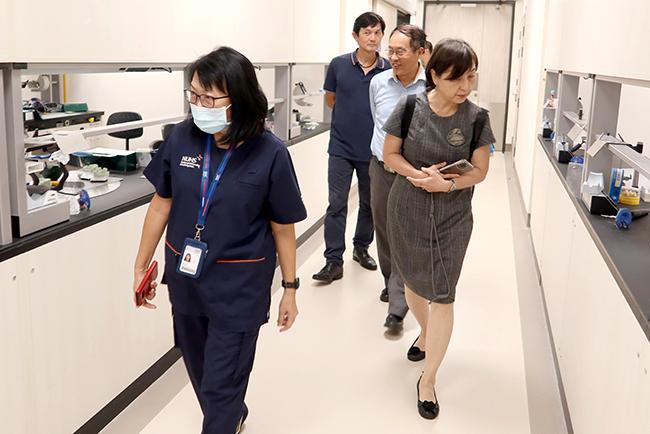
Participants were taken on a tour around the Faculty by
Associate Director, Alumni Relations, Dr Betty Mok.
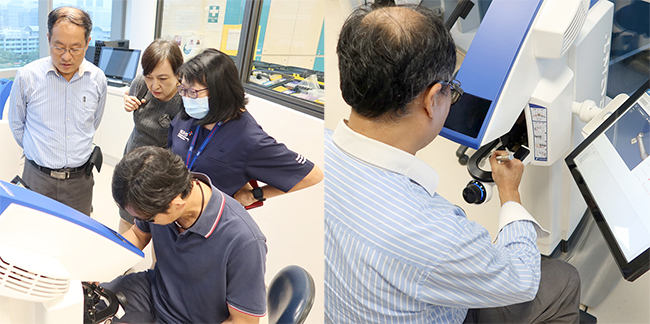
Alumni learned how technologies, such as the haptic simulator,
are used to train students at the Faculty.
Acting Dean, Associate Professor Wong Mun Loke then welcomed alumni back with an opening address before Assoc Prof Raymond Wong delved into how technologies such as 3D printing, augmented reality (AR), gene expression testing and health record digitalisation have enhanced diagnosis and treatment in the dentistry and medical arenas.
He noted that technological advancements have provided patients with more personalised and better treatment outcomes.
“The use of these technologies improves the frequency of good outcomes. For example, fixation plates can now be fitted to a patient’s bones using personalised 3D printed titanium plates. This is an advancement from manually adapted stock plates, where bones have to be fitted to the fixation plates instead. In the field of pathology, we can optimise outcomes by customising treatment for different types of tumours. As a clinician, I was taught to treat each patient like a family member. Keeping up with and wisely implementing the latest research and advances are thus crucial in ensuring patients receive the best care possible,” Assoc Prof Raymond Wong added.
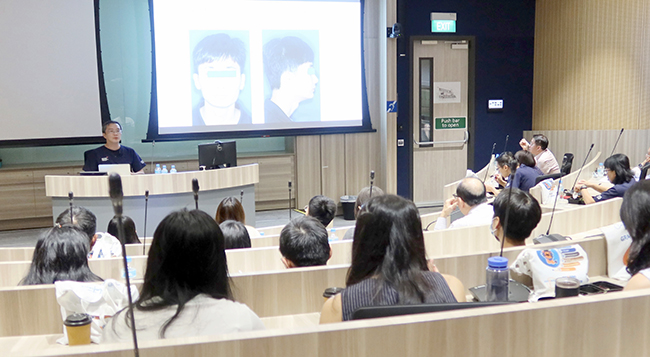
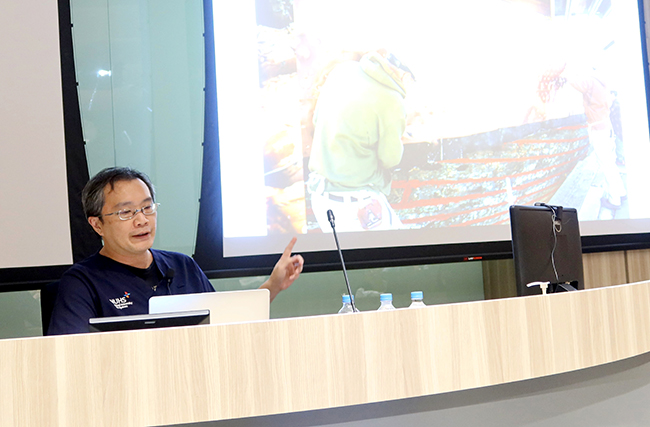
In his talk, Assoc Prof Raymond Wong shared how technologies have impacted healthcare
and dentistry and elevated the level of care that patients receive.
Alumni indicated that the talk helped them to understand more about how technologies could be adopted to make a difference to the dentistry practice and impact patient lives.
“The event served to highlight the exciting possibilities that are happening in the Faculty. The talk has certainly opened my eyes to the fact that the profession is gradually embracing the 4th Industrial Revolution. I hope by utilising technology, we can make our surgical outcomes more predictable,” said Dr Tan Hwee Hiang.
“The talk provided useful insights into how advanced technologies like artificial intelligence (AI), 3D printing, and AR are transforming dentistry. Specifically, it enlightened me on how digital techniques such as AR-assisted surgical planning, AI-powered diagnosis, and treatment planning could be applied in oral and maxillofacial surgery and kept me updated on the latest technological developments so I could improve patient care as a general dentist,” added Dr Tristan Peh.
“The field of oral and maxillofacial surgery is complex and can be overwhelming. With the help of evolving technologies, we can achieve what was once thought to be impossible. We cannot stop progress and change is inevitable in life. This talk has taught me that to stay relevant and be on top of our game, we need to keep improving ourselves, deepen our knowledge and be adventurous enough to explore new technologies,” shared Dr Josephine Tay.
Concluding, Dr Rosalind Ho noted that the “combined application of advanced tools has helped to save lives and restore patients’ conditions”. She highlighted that the talk underlined the impressive and remarkable impact that technologies could have on mankind and inspired general dentists like herself to adopt digital tools to improve, enhance, and upgrade the services they offer to patients.
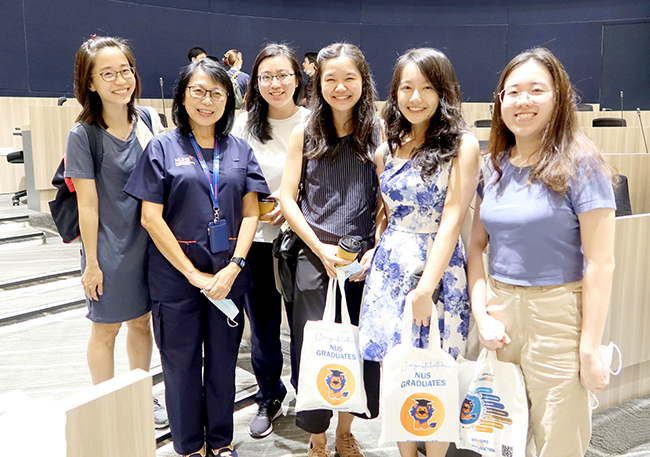
Attendees of the talk with Dr Mok (second from left).
The talk is part of the Faculty’s efforts to provide alumni with valuable insights into healthcare and dentistry, enabling them to keep abreast of the latest trends and developments in the profession. It also creates a useful opportunity for alumni to network with one another, share their experiences and connect with peers on similar topics of interest.

